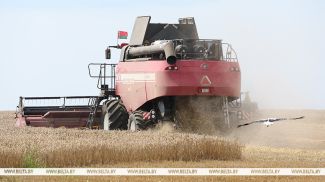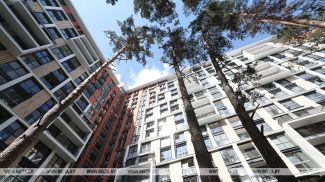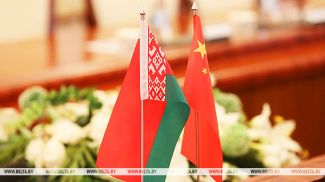MINSK, 13 February (BelTA) – Exporting flax fiber is now a profitable business in Belarus, said Belarusian Agriculture and Food Minister Leonid Zayats during the online conference hosted by the BelTA website on 13 February.
“Considering the latest events on foreign markets and the price that goes with our flax fiber exports at present, it is now profitable for Belarus to trade in flax. The prices that set in in November-December 2014 confirm it,” noted the Belarusian Agriculture and Food Minister. In his words, the Belarus president has given instructions to make 50,000-60,000 tonnes of flax fiber in the country per annum. According to the official, the instruction is mandatory and flax will continue to be grown in all the regions of the country.
Ten Belarusian flax mills have been modernized. They now process the bulk of the country's retted straw and are supposed to process 70% of the total. There are a total of 38 flax mills in the country, with 25 mills intended for retted straw processing while the rest will be repurposed. “Some of the mills will take care of processing oil flax seeds. There are three enterprises like that. The other enterprises will be converted into divisions of the leading flax mills that will make retted straw and process it into flax fiber,” explained Leonid Zayats.
The Minister said that the head of state had given instructions to reach new quality of retted straw and flax fiber. Orsha Linen Mill will have to be fully supplied with quality fiber for the sake of manufacturing priority flax products that will secure the enterprise's effective operation and profitability. In view of the plans as the leading flax-growing enterprise the Pruzhany flax mill in Brest Oblast will be used to host seminars for flax growers from all over the country. The seminars will spread the word about the best flax-farming and flax-processing techniques taking into account European experience.
“The flax industry is on the way to higher effectiveness. The production of retted straw should be profitable for everyone involved in this business. Last year we came up with ways to make 1ha of sugar beet as profitable as 1ha of flax. The balance was secured via subsidies and markup for retted straw and flax fiber,” said the Belarusian Agriculture and Food Minister. Leonid Zayats said the measures had allowed flax industry enterprises to considerably improve their economic status.
“I think that the end of the year 2014 was convenient and the year 2015 has been convenient so far. Demand for flax fiber is high and foreign buyers pay handsomely for these products. It is an opportunity to replenish the Belarusian treasury with foreign currency,” summed up Leonid Zayats.
“Considering the latest events on foreign markets and the price that goes with our flax fiber exports at present, it is now profitable for Belarus to trade in flax. The prices that set in in November-December 2014 confirm it,” noted the Belarusian Agriculture and Food Minister. In his words, the Belarus president has given instructions to make 50,000-60,000 tonnes of flax fiber in the country per annum. According to the official, the instruction is mandatory and flax will continue to be grown in all the regions of the country.
Ten Belarusian flax mills have been modernized. They now process the bulk of the country's retted straw and are supposed to process 70% of the total. There are a total of 38 flax mills in the country, with 25 mills intended for retted straw processing while the rest will be repurposed. “Some of the mills will take care of processing oil flax seeds. There are three enterprises like that. The other enterprises will be converted into divisions of the leading flax mills that will make retted straw and process it into flax fiber,” explained Leonid Zayats.
The Minister said that the head of state had given instructions to reach new quality of retted straw and flax fiber. Orsha Linen Mill will have to be fully supplied with quality fiber for the sake of manufacturing priority flax products that will secure the enterprise's effective operation and profitability. In view of the plans as the leading flax-growing enterprise the Pruzhany flax mill in Brest Oblast will be used to host seminars for flax growers from all over the country. The seminars will spread the word about the best flax-farming and flax-processing techniques taking into account European experience.
“The flax industry is on the way to higher effectiveness. The production of retted straw should be profitable for everyone involved in this business. Last year we came up with ways to make 1ha of sugar beet as profitable as 1ha of flax. The balance was secured via subsidies and markup for retted straw and flax fiber,” said the Belarusian Agriculture and Food Minister. Leonid Zayats said the measures had allowed flax industry enterprises to considerably improve their economic status.
“I think that the end of the year 2014 was convenient and the year 2015 has been convenient so far. Demand for flax fiber is high and foreign buyers pay handsomely for these products. It is an opportunity to replenish the Belarusian treasury with foreign currency,” summed up Leonid Zayats.













